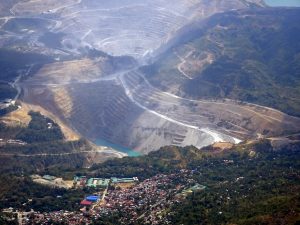The world is getting deadlier for environmental defenders.
On average, more than four people were killed every week protecting their land and the natural world in 2019, according to Global Witness. The most dangerous sector was mining, which accounted for 43 deaths, and the greatest number of killings occurred in the Philippines. This month, however, there’s a vital chance to tackle this and other issues plaguing mining in the Philippines when the sector opens itself up to an international transparency process.
Mining contributes relatively little to the Philippines’ GDP and generates few jobs, but it has long been a source of conflict. For those on its frontline, particularly local and indigenous communities opposing mining on or near their land, the consequences can be fatal. In 2091, 16 people were killed in mining-related deaths in the country.
One reason why mining fuels such controversy and violence is that efforts to exploit the Philippines’ vast untapped gold, copper, and nickel deposits — estimated at $1 trillion — have frequently displaced indigenous people and brought about environmental devastation.
Operating the big, open-pit mines needed to achieve economies of scale have led to landslides, pollution, the destruction of precious rainforests and wildlife, and one of the world’s worst toxic mining disasters. In 1996, a tunnel at the Marcopper mine on the island of Marinduque fractured and millions of tons of toxic waste poured into the Boac River and the sea, causing untold damage and triggering the evacuation of 20,000 people.
In the aftermath of the disaster, the government revised the implementing rules of the Mining Act to strengthen its environmental and social protections. In 2012, the Philippines took an important step toward a more accountable mining industry by joining the Extractive Industries Transparency Initiative (EITI), the global standard in the open and accountable management of oil, gas, and minerals.
This month, when the EITI begins the process of validating our progress in meeting its standards, it will have a golden opportunity to help create accountability in the governance of extractives and address other problems that still afflict mining in the Philippines.
As the foremost institution promoting openness and accountability in the extractive sectors, the EITI has the responsibility to ensure that civil society organizations can contribute effectively and meaningfully to improving how mining is run in the Philippines. If civil society cannot access or give information, exercise its rights to freedom of expression, peaceful assembly, association, and public participation, as well as hold its government accountable, the EITI will not be able to help countries transform how their oil, gas, and mining sectors are governed.
As someone working for an organization that supports the EITI process in the Philippines on the ground, and that acts as a bridge between affected communities, mining companies, other NGOs, and the government, I see first-hand how communities are being constrained in raising their concerns about mining operations in their areas.
Civic freedoms have eroded in the Philippines in recent years — a situation exacerbated during the COVID-19 lockdown, during which a number of land and environmental defenders were arrested. This has enabled mining operations to act without proper transparency or scrutiny, particularly in indigenous peoples’ ancestral lands, which are rich in natural resources.
Before permits are granted and mining starts in their areas, indigenous and local communities must be consulted and given space to raise their concerns. All too frequently this isn’t happening. In 2013, a briefing commissioned by the German government found that indigenous and local communities were commonly being denied their legal right to Free and Prior Informed Consent (FPIC) to mining projects in their areas.
Little has changed since. It is only by being fully informed that communities can truly decide what is in their best interests, and whether a new mine will benefit or damage their lives and livelihoods. This can only happen when they, civil society, and all those defending their land and the environment, are given the space to express their views without threats of violence or intimidation hanging over them.
The EITI has the chance to help make this happen in the Philippines, and must grasp it.

































